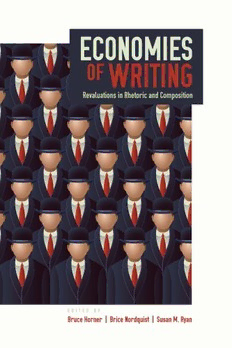
Economies of writing: revaluations in rhetoric and composition PDF
Preview Economies of writing: revaluations in rhetoric and composition
EconomiEs of Writing EconomiEs of Writing Revaluations in Rhetoric and Composition Edited by BrucE HornEr BricE nordquist susan m. ryan utaH statE univErsity PrEss Logan © 2017 by the University Press of Colorado Published by Utah State University Press An imprint of University Press of Colorado 5589 Arapahoe Avenue, Suite 206C Boulder, Colorado 80303 All rights reserved Manufactured in the United States of America The University Press of Colorado is a proud member of The Association of American University Presses. The University Press of Colorado is a cooperative publishing enterprise supported, in part, by Adams State University, Colorado State University, Fort Lewis College, Metropolitan State University of Denver, Regis University, University of Colorado, University of Northern Colorado, Utah State University, and Western State Colorado University. The paper used in this publication meets the minimum requirements of the American National Standard for Information Sciences—Permanence of Paper for Printed Library Materials. ANSI Z39.48-1992 ISBN: 978-1-60732-522-2 (paperback) ISBN: 978-1-60732-523-9 (ebook) Library of Congress Cataloging-in-Publication Data Names: Horner, Bruce, 1957– editor. | Nordquist, Brice, editor. | Ryan, Susan M., Ph.D., editor. Title: Economies of writing : revaluations in rhetoric and composition / [edited by] Bruce Horner, Brice Nordquist, Susan M. Ryan. Description: Logan : Utah State University Press, [2016] | Includes bibliographical references. Identifiers: LCCN 2016005516 | ISBN 9781607325222 (pbk.) | ISBN 9781607325239 (ebook) Subjects: LCSH: English language—Rhetoric—Study and teaching (Higher)—Economic aspects. | English language—Rhetoric—Study and teaching (Higher)—Political aspects. Classification: LCC PE1405.U6 E325 2016 | DDC 808/.042071173—dc23 LC record available at http://lccn.loc.gov/2016005516 Cover illustration © antoninaart/Shutterstock. contEnts Acknowledgments ix Introduction Bruce Horner, Brice Nordquist, and Susan M. Ryan 3 i institutional/disciPlinary EconomiEs 1. The Politics of Valuation in Writing Assessment Tony Scott 13 2. (Re)writing Economies in a Community College: Funding, Labor, and Basic Writing Katie Malcolm 30 3. Dwelling Work and the Teaching of Writing: Responding to the Pressures of For-Profit Instruction Steve Lamos 43 4. Occupying Research—Again/Still Joan Mullin and Jenn Fishman 55 5. The Political Economy of English: The “Capital” of Literature, Creative Writing, and Composition James T. Zebroski 68 ii EconomiEs of Writing PEdagogy and curriculum 6. Economies of Knowledge Transfer and the Use-Value of First-Year Composition Anis Bawarshi 87 7. Symbolic Capital in the First-Year Composition Classroom Yuching Jill Yang, Kacie Kiser, and Paul Kei Matsuda 99 vi COnTEnTS 8. A Question of Mimetics: Graduate-Student Writing Courses and the new “Basic” Kelly Ritter 112 9. Commodifying Writing: Handbook Simplicity versus Scholarly Complexity Samantha Looker 131 10. Psychoanalysis, Writing Pedagogy, and the Public: Toward a new Economy of Desire in the Classroom and in Composition Studies T. R. Johnson 145 iii EconomiEs of languagE and mEdium 11. Literate Resources and the Contingent Value of Language Rebecca Lorimer Leonard 161 12. The Rhetoric of Economic Costs and Social Benefits in US Healthcare Language Policy Scott Wible 172 13. Web 2.0 Writing as Engine of Information Capital Christian J. Pulver 191 14. www.engl.ish: Internationalized World Wide Web Domains and Translingual Complexities Jay Jordan 203 iv PuBlic Writing EconomiEs 15. Habermasochism: The Promise of Cyberpublics in an Information Economy Donna LeCourt 225 16. Tierra Contaminada: Economies of Writing and Contaminated Ground Jason Peters 238 17. Democratic Rhetoric in the Era of neoliberalism Phyllis Mentzell Ryder 252 Contents vii Afterword: Lessons Learned Deborah Brandt 269 References 273 About the Authors 295 Index 299 acknoWlEdgmEnts Many of the ideas and insights presented in this volume emerged out of work accomplished at the University of Louisville English department’s 2012 Thomas R. Watson Conference on Rhetoric and Composition, “Economies of Writing.” We are grateful to Min-Zhan Lu, the confer- ence director, for designing and organizing that conference, and to Dr. Thomas Watson, whose bequest made the event possible. We thank the University of Louisville’s Committee on Academic Publications and the College of Arts and Sciences at Syracuse University for providing funding in support of this project. For their support and encouragement, we are grateful to the University of Louisville English department’s former chair, Susan Griffin; its current chair, Glynis Ridley; and other colleagues at the university, as well as Lois Agnew, chair of the Department of Writing Studies, Rhetoric, and Composition at Syracuse University. Thanks go to Michael Spooner of Utah State University Press for his early interest in the project and for his support and guidance through- out, and to Allie Madden, Laura Furney, and Kami Day, also of Utah State University Press, for helping us see the book through to completion. Thanks also to the press’s anonymous reviewers, who provided valuable suggestions on earlier versions of this collection, and to Kathryn Perry, Laura Tetrault, and Sara Alvarez for their helpful research and editorial assistance. Portions of chapter 10 originally appeared in T. R. Johnson’s The Other Side of Pedagogy: Lacan’s Four Discourses and the Development of the Student Writer (2014). SUNY Press has kindly granted permission to reprint. Most of all we wish to thank our contributors, without whose efforts this book would not exist. Finally, we thank our families and friends for their patience and support as we worked on this book.
